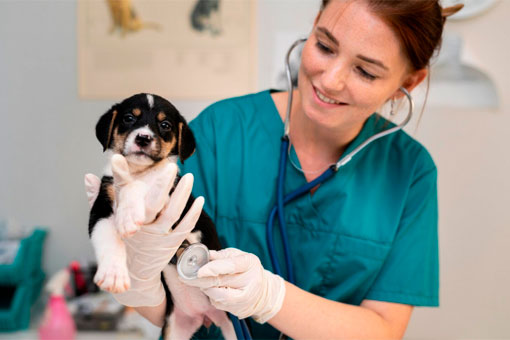Find a Vet
Trusted veterinarians services: dog vaccinations, emergency care, surgery and more. Click on your location below.
What to Look For in a Good Veterinarian
Choosing the right veterinarian is paramount to your dog’s long-term well-being. This person will be your primary partner in pet healthcare for years, so it’s essential to find a practice that aligns with your needs and your dog’s personality.
Here are six crucial factors to evaluate when selecting a veterinary clinic in Ireland:
What Questions to Ask When Choosing a Vet
When you contact or visit a potential veterinary clinic, having a checklist of questions prepared ensures you gather all the critical information needed to make an informed choice.
Here are the most important questions to ask the front desk staff or the veterinarian themselves:
Essential Questions for Logistics and Emergencies
- “What is your clear policy for out-of-hours emergencies?”
- Find out if they provide their own 24-hour service or if they refer to a specific local emergency veterinary hospital (and get the name and address of that referral clinic).
- “What are your standard opening and consultation hours, and do you offer weekend appointments?”
- Ensure their hours fit around your working schedule for routine appointments.
- “How quickly can I usually get a routine appointment, and what is your procedure for urgent, same-day sick appointments?”
- This tests their scheduling flexibility and capacity for urgent care.
- “What are the fees for a standard consultation and annual booster vaccinations?”
- Ask for transparency on the most common costs up front.
Critical Questions on Facilities and Standards
- “Do you have in-house diagnostic tools like X-ray, ultrasound, or blood testing facilities?”
- In-house equipment means faster answers when your dog is ill.
- “Who performs the dental cleanings (scale and polish), and what type of anaesthetic monitoring do you use for surgery?”
- This shows you are serious about surgical safety and the quality of essential procedures.
Questions on Philosophy and Preventative Care
Their answer should be tailored to local risk factors and your dog’s habits (e.g., if they swim in rivers or hike frequently).
- “What is your approach to pain management, especially after surgery?”
- A good vet should have a comprehensive plan for ensuring your dog is comfortable post-procedure.
- “Do you recommend a specific preventative healthcare plan (Pet Health Plan) for dogs, and what does it include?”
- These plans often offer discounts on annual care (vaccines, flea/worm treatment) and can help you budget.
- “What is your specific recommendation for parasite control (fleas, ticks, and worms) given our dog’s lifestyle in this area of Ireland?”
- Their answer should be tailored to local risk factors and your dog’s habits (e.g., if they swim in rivers or hike frequently).
Can You Just Switch Vets?

Yes, absolutely. You are free to change your dog’s veterinary practice at any time, for any reason—whether you are moving to a new locality or simply seeking a different kind of care.
Switching is a common, seamless process in Ireland:
- Select Your New Clinic: Use our directory to find the perfect new veterinary partner in your area.
- Request Records Transfer: Contact your new chosen clinic and ask them to request your dog’s full medical history and records (vaccination certificates, test results, etc.) from your previous vet.
- VCI Requirement: Under the guidelines of the Veterinary Council of Ireland (VCI), your previous vet is obligated to transfer the records promptly to the new practice. There should be no delay or fee for this administrative task.
The entire process is designed to be quick and easy, ensuring continuity of care for your dog without hassle.
Other Irish Dog Bussiness
Would you like to promote your business?
Your establishment can appear as a featured listing at the top of our directory. Want to learn more?